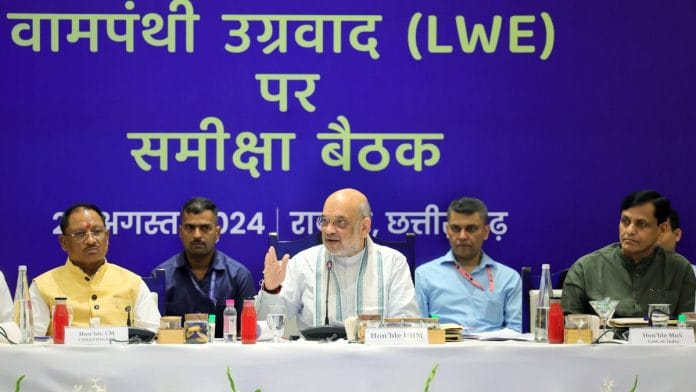New Delhi: Union Home Minister Amit Shah has assured the Chhattisgarh Police that all the resources, like weapons or telecom equipment, they need for their ongoing crackdown on Naxal activity will be provided within 20 days, ThePrint has learnt.
Speaking to the media Saturday, Shah emphasised that now is the time to deliver a “final blow” to the Naxal problem in the country, and that a “strong and ruthless strategy” is needed to address the issue.
Shah was speaking to the press after chairing a high-level review meeting on Left-wing extremism (LWE) in Raipur, Chhattisgarh, where he also set a goal of making India “Naxal-free” by March 2026.
Officials aware of the meeting said that the home minister is very “categorical” about cooperating with state police forces when there is any plan to carry out operations in border regions.
“It’s a no-brainer that Maoists use lacunae at borders between states to evade security forces, and there was an assertion on increasing the cooperation and smooth transfer of intelligence communication with other security agencies and forces to better prepare and plan for operations,” an officer who attended the meeting told ThePrint on condition of anonymity.
The year 2022, Shah said, was the first year in four decades when casualties dipped below 100. Additionally, the 2014 to 2024 decade recorded the lowest number of LWE incidents and top 14 Naxalite leaders were neutralised during this period.
“There were 16,463 incidents reported between 2004 and 2014 and 7,744 incidents were reported between 2014 and 2024, marking a significant dip of 53 percent. There were 6,617 casualties among security forces and civilians between 2004-2014 which dipped by 70 percent,” he said.
Moreover, casualties of security forces declined by 73 percent while death of civilians due to LWE incidents decreased by 69 percent, he added.
Apart from Home Secretary Govind Mohan and the Director of Intelligence Bureau Tapan Deka, the meeting was attended by chief secretaries and director generals of police (DGPs) from Chhattisgarh, Odisha, Madhya Pradesh, Andhra Pradesh, Telangana, and Maharashtra. Jharkhand was represented by an additional director general of police rank officer.
According to the official quoted above, Shah has asked the DGPs and chief secretaries in Naxal-affected states to “continuously monitor” both the movement of Naxals as well as development in the areas dominated by them.
He also asked DGPs to meet officials involved in the anti-Naxal operations every week while the chief secretaries were tasked to carry out review of development works in Naxal-affected areas every 15 days.
“A lot of these meetings were already taking place in states such as Chhattisgarh and Jharkhand where Maoists problem still exist but now that the timeline and SOP of the meeting has been discussed at such a high-level meeting, it will now become a policy in Naxal-affected states,” another official who was at the meeting told ThePrint.
At the press conference, Shah announced that the Chhattisgarh government, led by Vishnu Deo Sai, will introduce a new surrender policy within the next month or two. This policy is intended to be a final opportunity for Naxal cadres to reintegrate into society.
An official told ThePrint that the policy will be deliberated on at the Ministry of Home Affairs level and could become an updated nationwide surrender policy for Naxals.
“As soon as the Chhattisgarh government, empowered by the MHA, finalises the surrender policy, the Centre will review it and most likely adopt it as a national policy,” said an officer privy to the details.
Also read: School dropout with ‘weakness for money’ — who was Maoist Shankar Rao, killed in Bastar operation
Choking their finances
The financing of the Maoists was a major topic of discussion during the meeting. State officers were asked to provide specific ideas and policies to cut off the financial support Maoist cadres get, officials told ThePrint.
They added that the Chhattisgarh government has already transferred several Maoist-related cases, including those involving their finances, to the National Investigation Agency (NIA) under the direction of the MHA.
At the meeting, Shah urged all states to work together in launching a “holistic attack” on the infrastructure and support networks funding Maoists in each state.
Shah emphasised the importance of involving the NIA in LWE cases and suggested that all such cases currently handled by police forces should be transferred to the NIA. Additionally, officials responsible for investigation and prosecution should receive training from NIA experts who specialise in terror financing cases.
Officials also mentioned that there was discussion about setting up a state investigation agency in each Naxal-affected state. These agencies would act as nodal bodies supporting the NIA, similar to the SIA established by the Chhattisgarh government in March to specifically address Maoist cases.
All praise for Chhattisgarh
The home minister also praised the present state government at the meeting, while alleging that anti-Naxal campaigns had slowed during the previous Congress government led by Bhupesh Baghel.
“There have been more arrests, surrenders, neutralisation as well as development since the [BJP] government has come to power,” Shah asserted.
Officials at the meeting said that Chhattisgarh’s campaign against Maoists was also praised by senior officials of the security establishment who attended the meeting.
“Chhattisgarh is dealing with nearly 80 percent of the Maoists’ problem and hence both the success and failure of the security forces in Chhattisgarh will have an impact on the Centre’s fight against the red army. Hence, the crackdown and operations were commended,” an officer said.
(Edited by Zinnia Ray Chaudhuri)
Also read: Collapse of 2 ‘Urban Naxal’ cases shows panic & police overreach are worse than Maoist insurgency






